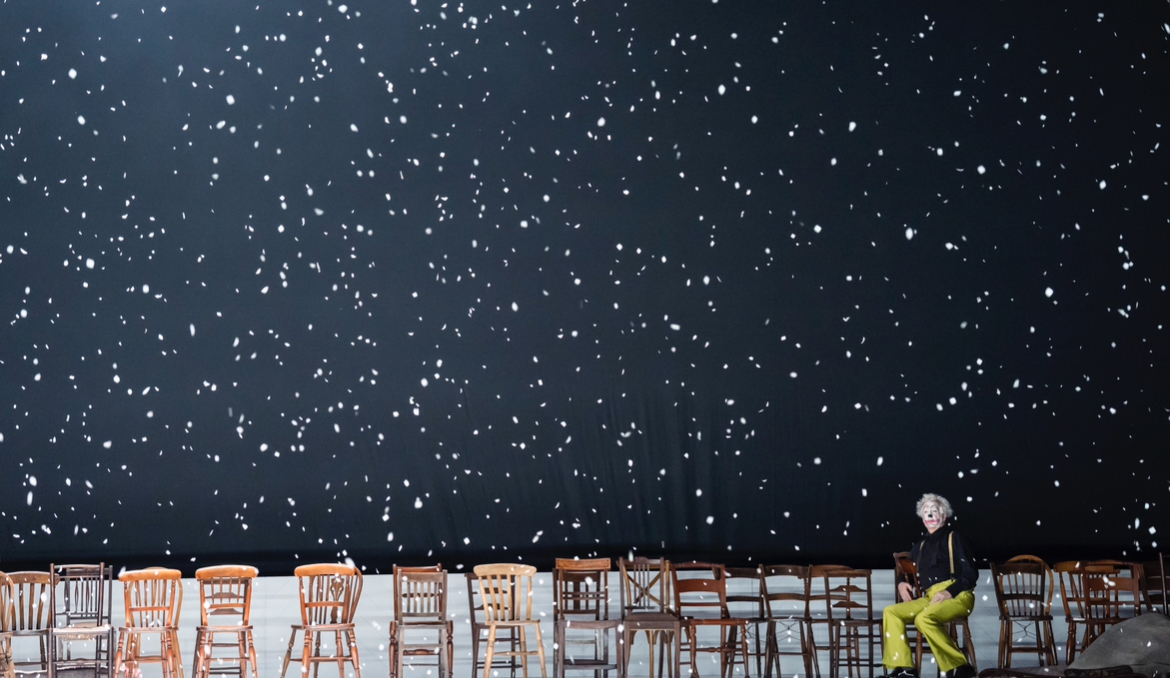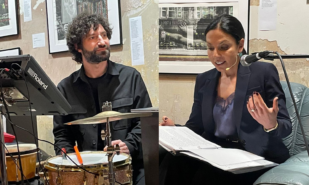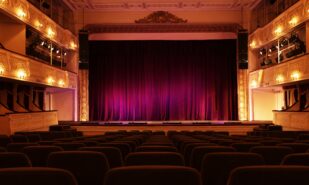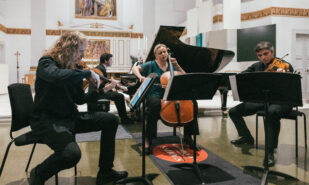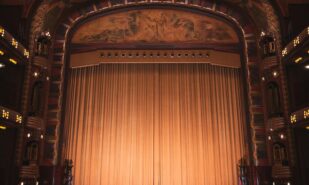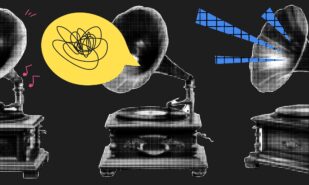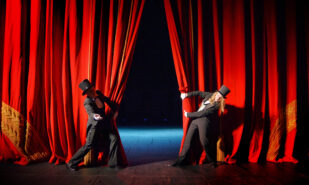“Oh, how they suffer!”: the minimalism of new “Eugene Onegin” at the Royal Opera House is gradually convincing
The Royal Opera House is currently finishing its runs of Tchaikovsky’s “Eugene Onegin”, the opera based on Alexander Pushkin’s verse novel. The last two opportunities to see “Eugene Onegin” are 10 and 14 October, and we think you shouldn’t miss them. Perhaps Russian-speaking Londoners will come to the theatre expecting to see sets depicting the beauty of Russian country estates and the opulence of St. Petersburg balls. Such expectations from productions of “ Eugene Onegin” are a tribute to tradition, a habit of seeing conservative albeit really beautiful designs. But let us not forget that Tchaikovsky once tried to avoid the pressures of Pushkin’s canonical text’s power over Russian audiences by selecting only individual “lyrical scenes” from it and arranging them into an intimate, very personal story of human disappointment and loss.

©Tristram Kenton 09-24
By reducing the set design (by artist Hyemi Shin) to a stripped black stage minimum and moving all the peasant choirs offstage, the director of this new production of “Onegin”, Ted Huffman, focuses our attention specifically on the two young couples in this story. At first, such a decision may cause bewilderment and annoyance. Where is the visual beauty, one might ask. Where are all those autumn trees and St. Petersburg lush nobility dressses? But as a black-and-white photograph sometimes highlights the details and structure of the composition, in this “Eugene Onegin” the viewer will have the opportunity to notice non-obvious parallels between the fates of the four young people of the story and be surprised by psychological interpretations that might not have occurred to us before.

©Tristram Kenton 09-24
The American playwright and director Ted Huffman, the author of several opera librettos who has already directed the opera “4.48 Psychosis” based on Sarah Kane’s cult play, did not make this decision out of a desire to be egregious. There is nothing visually grotesque, provocative or screamingly modern about this production. Even the director’s decision to expand the role of the French teacher Monsieur Triquet to a trickster, a clown-demon of this show becomes appropriate and seems to be a tribute to a certain retro-tradition, to films of the 1960-70s. Huffman, with an intention quite similar to that of Tchaikovsky to overrun the pressures of a famous classical work, decides to free Tchaikovsky’s opera and his production from the weight of any expectations. He approaches it as a “non-Russian man” , that is, he is looking for things that are relevant and relatable in any epoch annd culture. That is why it is important for Huffman to make the opera about the Russian “superfluous man” Onegin and the correct, kind, sensual girl Tatiana more minimalistic and open to new psychological interpretations in the nuances of the main characters’ relationships. All of a sudden we notice that it is not only Tatyana and Onegin, but also Lensky and Olga, as well as Gremin, the elder Larina and even Monsieur Triquet that have experienced resignation to loss and the passing of time like water into the sand.

©Tristram Kenton 09-24
Huffman, who has paid attention to the innovative montage of scenes in the libretto by Tchaikovsky and Konstantin Shilovsky, develops the potential for inner freedom inherent in the text. The director comes up with titles for seven of Tchaikovsky’s lyrical scenes, building up a precise chronology of events (we are used to knowing it from the novel, but in the opera it is by no means obvious) – “Autumn”, “That Night” (the scene of Tatiana’s letter), “Next Morning”, “Winter” (the scene of Tatyana’s birthday party), “Early Next Morning” (the duel scene), “Years Later” and another “Next Morning” (the scene of Tatyana rejecting Onegin). As can be seen even from these titles, the productions adopts a Chekhovian way of indicating the passage of time. And so the main theme of Huffman’s production seems to be our memory of bygone time and youth, regrets about decisions made or not made. It seems that the production, with its black and white walls and only isolated splashes of colour, is itself a product of someone’s memory. May be, of the despairing Onegin? The fragmentary nature of the opera suddenly acquires a new meaning – it is just an uneven memory. And the clown-teacher Triquet serves as a catharsis of these memories, their witness, a mystical keeper of time.

©Tristram Kenton 09-24
From this perspective, the unusual directorial decisions also become clearer: at the beginning of the opera, the Canadian baritone Gordon Bintner makes a deep bow to the audiences and moves into the background, watching the first scene of the opera and never truly ‘appearing’ as a guest. At the end, he mirrors the beginning with a similar bow. Lensky also bows, suddenly standing up after the duel and taking a chair. Both men are being observed by Monsieur Triquet, who earlier had been in charge of Tatiana’s birthday party, delighting everyone with a cake and balloons. He then smeared his clownish make-up all over his face, being unable to stop the quarrel or actually having planned it all the way. The opera seems to be a reminiscence of the past, an attempt to live it anew, an unequal struggle with fate, which is always laughing at our plans. Other decisions are less clear and perhaps a bit flat – Tatiana’s two children at her meeting with Onegin (maybe she just can’t leave them?), Olga and Onegin’s kisses before the cotillion dance (why would that romance happen), Lensky’s suicide with Onegin simply putting his revolver on the floor (where would the guilt come from then?).

©Tristram Kenton 09-24
These decisions are often not supported by the text of the opera (why would Nanny get married at the age of 13 in this timeless world?). Musical integrity often suffers as well. Kristina Mkhitaryan, who has an excellent command of her voice and garnered a deserved applause, lost the unity of her performance of Tatiana’s letter due to constantly moving around. Huffman makes her express her doubts by running back and forth on the stage, and that doesn’t help either her or us to concentrate on her emotions. The sleepy Olga (Avery Amereau) writes the letter for Tatyana as she staggers through the stage, leaning her head on the huge golden frame of the Royal Opera House. Onegin will do the same later at the moment of thwarted passions – a clever rhyme. Tatyana is not alone in this most intimate and long scene in the Russian operatic canon – does she trust Olga that much? Something is lost here, both musically and psychologically. Lensky’s performance also lacks integrity (Armenian tenor Liparit Avetisyan was generally very good), as the director has invented too many psychological nuances for his character. The Canadian baritone Gordon Bintner appeared in a title role – and made our focus shift to Tatyana as he was not equalling Mkhitaryan. His Russian diction Russian left much to be desired, his emotionality was revealed behind his performed shallowness. Bittner didn’t empower his appearances enough and sometimes made vocal mistakes, as was the case in a duet with Lensky before the duel, where the perfect unity of the two voices is a must.

©Tristram Kenton 09-24
The Royal Opera House’s orchestra under Henrik Nánási also seemed to make a lot of fuss when it was not needed, sometimes producing weak and uneven sound, with an overall strange distribution of dynamics, as if the minimalism of Huffman’s production had been transferred to the orchestra. But here we really expected the contrast of the set designs with the passionate lyricism of Tchaikovsky, and it is not wise to hush the music. The point of perfection in this production could be found in Dmitry Belosselskiy’s (making his debut at ROH) performance of Prince Gremin’s aria – it was an example of mastery and perfect vocal execution of every detail. Christophe Mortagne (Monsieur Triquet), who sang his aria in French (Russian-speaking audiences have never heard it done like that), and played a fake wish to comically please, a desire to change the tone of the party, suddenly brought a note of high tragedy to the opera, and was magnificent. The chorus (chorus director William Spaulding) also left a very good impression. In the scene of Tatyana’s birthday party men and women come centerstage in turns, singing about their hobbies (men) and everyday routines (women). The chorus became a separate unique character in the production, as these men and women’s sincere emotions and ability to have fun and dance beautifully (movement director Lucy Burge) often contrasted with the tragic existence of the main characters.

©Tristram Kenton 09-24
Undoubtedly, this “Eugene Onegin” will give ground for conversations and discussions among opera connnoiseurs, and help us reconsider and revisit this music and text, or to get to know them without prejudices and expectations. This Onegin is a must-see, even if you will want to argue with it or marvel at it.

